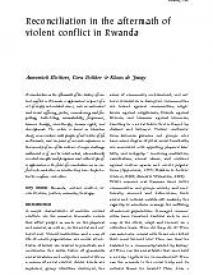Reconciliation in the aftermath of violent conflict in Rwanda
Reconciliation in the aftermath of the history of violent conflict in Rwanda is approached as part of a set of deeply interrelated issues, such as individual and social suffering, justice, remembering and forgetting, truth-telling accountability, forgiveness, trauma therapy, socio-therapy, human rights, and development. The article is based on literature study, conversaions with people of all walks of life in Rwanda, and six years of research experience in this country of one of the authors. A major challenge addressed is if and to what extent, internationally oriented concepts and programs and cultural specific approaches in the field of reconciliation are in conflict with each other or whether they have the potential to reinforce each other. Key words: Rwanda, violent conflict, reconciliation, justice, memory, therapy
Geachte bezoeker,
De informatie die u nu opvraagt, kan door psychotraumanet niet aan u worden getoond. Dit kan verschillende redenen hebben,
waarvan (bescherming van het) auteursrecht de meeste voorkomende is. Wanneer het mogelijk is om u door te verwijzen naar de bron
van deze informatie, dan ziet u hier onder een link naar die plek.
Als er geen link staat, kunt u contact opnemen met de bibliotheek,
die u verder op weg kan helpen.
Met vriendelijke groet,
Het psychotraumanet-team.
Reference:
Annemiek Richters, Cora Dekker, Klaas de Jonge | 2005
In: Intervention: the international journal of mental health, psychosocial work and counselling in areas of armed conflict, ISSN 1571-8883 | 3 | 3 | 203-221
http://www.interventionjournal.com/sites/default/files/203_221_Richters.pdf
In: Intervention: the international journal of mental health, psychosocial work and counselling in areas of armed conflict, ISSN 1571-8883 | 3 | 3 | 203-221
http://www.interventionjournal.com/sites/default/files/203_221_Richters.pdf


